What is a Parable?
Parables are stories that use typical, everyday situations in order to teach important truths. Jesus used many parables to teach his followers about the KINGDOM OF GOD.
When people talk about the ministry of Jesus, it’s easy to focus on his miracles. Jesus performed some amazing feats that the world had never seen (and hasn’t seen since). But one of the most exciting things about His ministry was His teaching style.
Jesus taught using parables—simple stories intended to impart a spiritual lesson. He’s so identified with this teaching style that Mark’s Gospel tells us that “He did not say anything to them without using a parable”. We’ve collected all of Jesus’s parables from the synoptic Gospels: Matthew, Mark, and Luke. With each parable, you’ll discover:
Where it is located in Scripture
Who was present for this teaching
Why it was given
What is the key verse

THE SERMON ON THE MOUNT
Matthew 5, Matthew 6, Matthew 7
Jesus’ teachings during the Sermon on the Mount represent the major ideas of the Christian life. For example, Jesus taught about subjects such as prayer, justice, care for the needy, handling the religious law, divorce, fasting, judging other people, salvation, and much more.
The Sermon on the Mount is a collection of sayings and teachings attributed to Jesus Christ, which emphasizes his moral teaching takes place relatively early in the Ministry of Jesus after he has been baptized by John the Baptist, finished his fasting and spiritual retreat in the desert, and began to preach in Galilee. The name and location of the mountain are unstated; the Mount of Beatitudes is the traditional interpretation.
The Sermon is the longest continuous discourse of Jesus found in the New Testament and has been one of the most widely quoted elements of the Canonical Gospels. It includes some of the best-known teachings of Jesus, such as the Beatitudes, and the widely recited Lord’s Prayer. The Sermon on the Mount is generally considered to contain the central tenets of Christian discipleship.
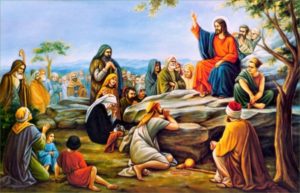
THE BEATITUDES
Matthew 5:3-11, Luke 6:20-26
The Beatitudes are sayings attributed to Jesus and in particular, eight blessings recounted by Jesus in the Sermon on the Mount in the Gospel of Matthew, and four in the Sermon on the Plain in the Gospel of Luke, followed by four woes which mirror the blessings. Each is a proverb-like proclamation, without narrative.
The phrase Jesus uses “poor in spirit” refers to one’s spiritual condition. Those that are poor in spirit realize that nothing they can do can get them into heaven. They are powerless, helpless, and undeserving. They don’t sound very blessed, do they? But they are blessed because Jesus has not forgotten them. They are promised the kingdom of heaven.
This flies in the face of the way the world operates. It’s the strongest and most put-together people that get the good life. But not so in God’s kingdom. It’s those that become poor, those that recognize their own need, those that cry out for their savior that will receive the kingdom.
If we want the best life each of us must first make ourselves poor in spirit. We must recognize our dire situation and that the only way out is to rely on God.

THE GREAT COMMANDMENT
Matthew 22:37-39, Mark 12:29-31, Luke 10:27
The law of God comes from the love of God, and our love of God is expressed in obedience to his law. Jesus was asked to name a commandment in the law which he considered to be the great commandment. It means that there was no point in them unless they were offered out of wholehearted love for God.
It means that yes in order to love God true in our hearts that we also love our neighbors true in our hearts. … For God is love and loving him loyally means the feeling of love can inspire us to love others

THE GOLDEN RULE
Matthew 7:12, Luke 6:31
The Golden Rule is the principle of treating others as one wants to be treated. Jesus summarises the whole of the Old Testament in a single phrase: “Do unto others as you would have them do unto you.” This maxim, known as “the golden rule” of ethics, is sometimes portrayed as an exclusively Christian concept.

THE GRAIN OF MUSTARD SEED
Matthew 13:31-32, Mark 4:1-20, Luke 13:18-19
Mustard seed, when it is sown in the earth, though it is less than all the seeds that are on the earth, yet when it is sown, grows up, and becomes greater than all the herbs, and puts out great branches, so that the birds of the sky can lodge under its shadow. A small or seemingly insignificant thing that has the potential to grow or develop into something vast or formidable.
Every child is a grain of mustard seed—at once relatively small in the scope of the world, but having within them the power to shape the very course of human existence. The mustard seed is known for its faith because, having no other option, it must choose to trust God and give everything it has to either become a tree or die trying.
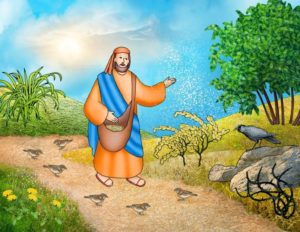

THE PARABLE OF SOWER
Matthew 13:1-23, Mark 4:1-20
Jesus tells of a farmer who sows seed indiscriminately. Some seed falls on the path (wayside) with no soil, some on rocky ground with little soil, some on soil that contains thorns, and some on good soil. In the first case, the seed is taken away; in the second and third soils, the seed fails to produce a crop; but when it falls on good soil, it grows and yields thirty-, sixty-, or a hundred-fold. Jesus later explains to his disciples that the seed represents the Gospel, the sower represents anyone who proclaims it, and the various soils represent people’s responses to it.
Jesus did not usually explain parables as part of their appeal for the listener was to work out the meaning. However, on this occasion, he explained it to the disciples.
1. Some people cannot remember or understand what they have been told. This is like the seed falling on the path.
2. The person who responds enthusiastically to God’s word, but falls away when there are difficulties, is like the seed that fell on the rocky places.
3. The seed falling among thorns is like the person who lets the worries of life get in the way of following God.
4. The seed falling on the good soil represents those who hear the word of God and respond positively, but some make more commitment than others.

THE PARABLE OF GROWING SEED
Mark 4:26-29
The Parable of the Growing Seed is thus about the growth of the kingdom of God until Jesus returns, during which time we must patiently sow the seed of the Word in anticipation of a harvest. The parable refers to an intervening time between the first and second coming of Jesus as the Messiah.
When Jesus observes that, after sowing the seed, the farmer will then “sleep by night and rise by day,” He indicates that he goes about his daily routine while the seed sprouts and grows. This fact, combined with Jesus’ statement that “he himself does not know how” it grows, emphasizes the fact that the farmer does not cause the seed to grow. It happens in a manner that he himself neither causes nor understands. In this way, Jesus was helping His disciples to see that, although the kingdom had not come as they had expected it to come, it was nevertheless present and growing, despite their failure to fully understand how this was happening. As we continue to sow the seed of the Word, the kingdom of God is growing in a manner that we do not cause and that we cannot fully comprehend.
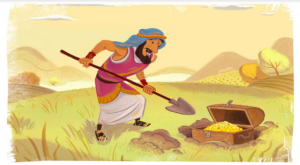
SOME PARABLES ABOUT THE KINGDOM OF HEAVEN
Matthew 13:24-52
Jesus used parables to describe what the kingdom of God is like and how people should act if they wanted to be in the Kingdom. The meaning of this was that the disciples had to be like a lamp and let others see the light of God was coming from them. They had to set a good example for others to follow.
Here are five ways to spiritually prepare for Jesus’ return.
Pray. If you want to know what God knows, begin by asking Him. Listen, sometimes we think we know what God wants for us, but God’s knowledge isn’t always obvious. Watch, Saint Paul said we need to watch and be ready, store and improve.
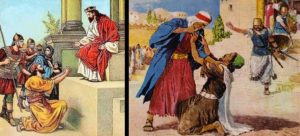
THE PARABLE OF THE UNFORGIVING SERVANT
Matthew 18:23-35
It is important to forgive others as we are forgiven by God, the significant part and moral of the story is to treat other’s the way you want to be treated. The servant who was spared should be understanding and empathetic towards the other servant but instead refuses to forgive his debt.

THE PARABLE OF THE WORKERS IN THE VINEYARD
Matthew 20:1-16
The parable has often been interpreted to mean that even those who are converted to Christianity late in life earn equal rewards along with those converted early and that people who convert early in life need not feel jealous of those later converts. An alternative interpretation identifies the early laborers as Jews, some of whom resent the late-comers (Gentiles) being welcomed as equals in God’s Kingdom.
we are all the eleventh-hour workers; to change the metaphor, we are all honored guests of God in the kingdom. It is not really necessary to decide who the eleventh-hour workers are. The point of the parable—both at the level of Jesus and the level of Matthew’s Gospel—is that God saves by grace, not by our worthiness. That applies to all of us.

THE PARABLE OF TENANTS IN THE VINEYARD
Matthew 21:33-46, Mark 12:1-11, Luke 20:9-18
The owner of the vineyard is God and the son is Jesus. The traditional interpretation about the owner leaving the vineyard is that God leaving humans the free will to act, “He seems to leave the vineyard so as to leave the keepers of the vineyard free choice of action.
This parable also teaches us about God’s goodness and patience. He prepares his vineyard and leases it to evil tenants, who only repay him with more evil, killing the landowner’s servants and eventually his own son. But God’s patience has limits and the wretched tenants suffered a wretched death and the vineyard given to new tenants that would produce its fruit. Clearly, this parable refers to the Jews, who were the first-born children of God. Today, the majority of the Jewish people still do not recognize that 2,000 years ago, the long-awaited Messiah did come from amongst the Jewish people. But because of the unbelief of the Jews, God leased his vineyard to the new tenants, whom the Jews say are the Gentiles.
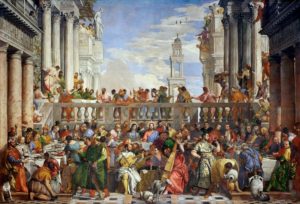
THE PARABLE OF THE WEDDING FEAST
Matthew 22:1-14, Luke 14:15-24
The parable of the wedding feast is a parable about universalism . Jesus teaches that the Kingdom of God is open to everyone, not only Jews.
He spoke a parable to those who were invited when he noticed how they chose the best seats, and said to them, “When you are invited by anyone to a marriage feast, don’t sit in the best seat, since perhaps someone more honorable than you might be invited by him, and he who invited both of you would come and tell you, ‘Make room for this person. Then you would begin, with shame, to take the lowest place. But when you are invited, go and sit in the lowest place, so that when he who invited you comes, he may tell you, ‘Friend, move up higher.’ Then you will be honored in the presence of all who sit at the table with you. For everyone who exalts himself will be humbled, and whoever humbles himself will be exalted.”
He also said to the one who had invited him, “When you make a dinner or a supper, don’t call your friends, nor your brothers, nor your kinsmen, nor rich neighbors, or perhaps they might also return the favor, and pay you back. But when you make a feast, ask the poor, the maimed, the lame, or the blind; and you will be blessed because they don’t have the resources to repay you. For you will be repaid in the resurrection of the righteous.”
